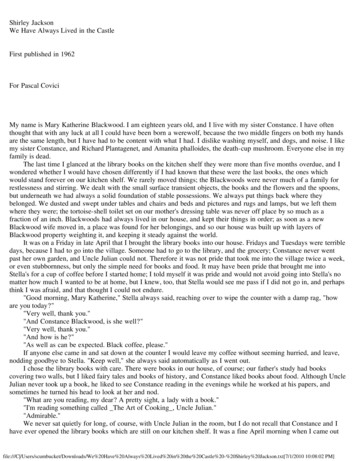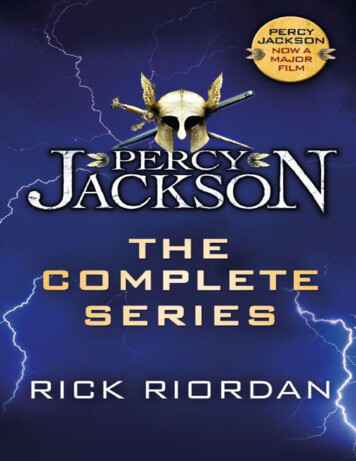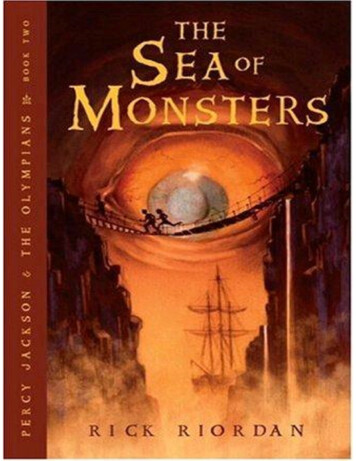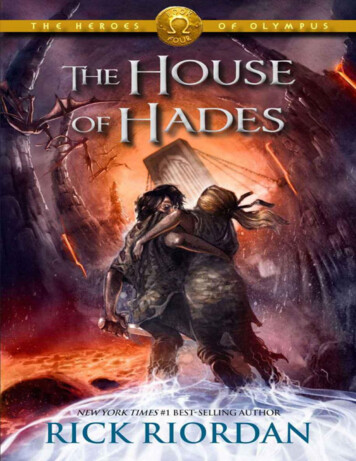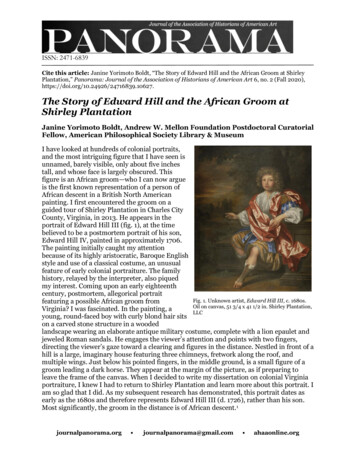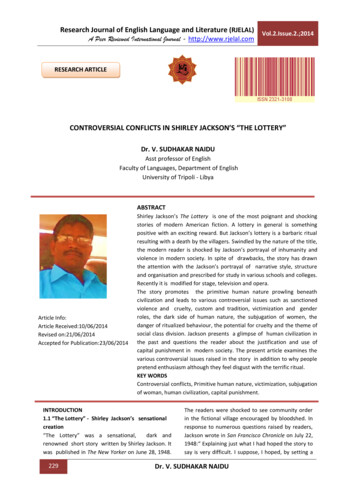
Transcription
Research Journal of English Language and Literature (RJELAL)A Peer Reviewed International Journal - http://www.rjelal.comVol.2.Issue.2.;2014RESEARCH ARTICLECONTROVERSIAL CONFLICTS IN SHIRLEY JACKSON’S “THE LOTTERY”Dr. V. SUDHAKAR NAIDUAsst professor of EnglishFaculty of Languages, Department of EnglishUniversity of Tripoli - LibyaABSTRACTArticle Info:Article Received:10/06/2014Revised on:21/06/2014Accepted for Publication:23/06/2014Shirley Jackson’s The Lottery is one of the most poignant and shockingstories of modern American fiction. A lottery in general is somethingpositive with an exciting reward. But Jackson’s lottery is a barbaric ritualresulting with a death by the villagers. Swindled by the nature of the title,the modern reader is shocked by Jackson’s portrayal of inhumanity andviolence in modern society. In spite of drawbacks, the story has drawnthe attention with the Jackson’s portrayal of narrative style, structureand organisation and prescribed for study in various schools and colleges.Recently it is modified for stage, television and opera.The story promotes the primitive human nature prowling beneathcivilization and leads to various controversial issues such as sanctionedviolence and cruelty, custom and tradition, victimization and genderroles, the dark side of human nature, the subjugation of women, thedanger of ritualized behaviour, the potential for cruelty and the theme ofsocial class division. Jackson presents a glimpse of human civilization inthe past and questions the reader about the justification and use ofcapital punishment in modern society. The present article examines thevarious controversial issues raised in the story in addition to why peoplepretend enthusiasm although they feel disgust with the terrific ritual.KEY WORDSControversial conflicts, Primitive human nature, victimization, subjugationof woman, human civilization, capital punishment.INTRODUCTION1.1 “The Lottery” - Shirley Jackson’s sensationalcreation“The Lottery” was a sensational,dark andrenowned short story written by Shirley Jackson. Itwas published in The New Yorker on June 28, 1948.229The readers were shocked to see community orderin the fictional village encouraged by bloodshed. Inresponse to numerous questions raised by readers,Jackson wrote in San Francisco Chronicle on July 22,1948:“ Explaining just what I had hoped the story tosay is very difficult. I suppose, I hoped, by setting aDr. V. SUDHAKAR NAIDU
Research Journal of English Language and Literature (RJELAL)A Peer Reviewed International Journal - http://www.rjelal.comparticularly brutal ancient rite in the present and inmy own village to shock the story’s readers with agraphic dramatization of the pointless violence andgeneral inhumanity in their own lives”. Jackson wassurprised by the negative response of her readers.The story was banned in some countries and thepublisher received many adverse comments on thestory. Also many readers stopped the subscriptions.1.2 The title, “ The Lottery” - adverse to reader’sexpectationsBy the nature of the title, the modern readers wouldexpect the story about a winner who gains apositive experience or a reward. But they wereshocked by Jackson's portrayal of inhumanity andviolence. At the end of the story, a young boy isbeing handed a small stone with which to kill hisown mother is one of the most shocking incidents inthe story. In this case, Jackson's lottery results notwith a winner but with a loser who is stoned todeath by the village. Perhaps this extremelysubversive irony was a factor that led to manyreaders' outrage over the story when it was firstpublished.2-SANCTIONED VIOLENCE AND INHUMANITY2.1 Lack of seriousnessIn the beginning of the story the children have beendismissed from school for summer. They are free toplay recklessly with the wild kids. People used totalk about everyday events and refrain fromlaughing. The women are likely to share gossip withchildren. Besides, the lottery was conducted withsquare dances and teenage clubs. It is considered a"civic activity," but dances and clubs are hardly onthe same level as death-by-lottery. When TessieHutchinson finally arrives, Mr. Summers wants to"get this over with so 's we can go back to work."The grave contradiction here is the normalcy withwhich the town operates. Stoning takes place andit's "business as usual."2.2 The victim’s words unheardThe victim of the lottery has to bear theconsequences. Also nobody likes to listen andsupport the victim. There is no argument to judgewhat is right or wrong. Tessie begins to argue whileBill selects the black spot. The neighbour calls, "Be agood sport, Tessie." Her husband straight out tellsher to shut-up. At this point, they don't know whowill die in the family. Tessie shows the vicious230Vol.2.Issue.2.;2014nature of people and their desire to survive at allcosts. She insists, "It wasn't fair." But while shepleads and argues, the men put five pieces of paperin the box: one a piece for each parent, and one foreach of their children. Uniquely, the violent natureof people is seen to be like that of animals. They willattack and kill adults as well as the young. In thelottery, not even the children are spared. Little Daveisn't even old enough to open his own paper,indicating he wouldn't be old enough to understandwhat is being done to him if he were chosen to die.2.3 Prophesy and SuspenseMany of the innocuous details throughout “TheLottery” foreshadow the violent conclusion. In thesecond paragraph, children put stones in theirpockets and make piles of stones in the townsquare, which seems like innocent play until thestones’ true purpose becomes clear at the end ofthe story. Tessie’s late arrival at the lottery instantlysets her apart from the crowd, and the observationMr. Summers makes—“Thought we were going tohave to get on without you”—is dissonantlyprescient about Tessie’s fate.Jackson builds suspense in “The Lottery” and doesnot reveal the true nature of the lottery until thefirst stone hits Tessie’s head. She never tells us whatthe lottery is about or purpose. She begins to revealthat something is awry when the lottery begins andthe crowd grows nervous, and she intensifies thefeeling when Tessie hysterically protests Bill’s“winning” selection. And she gives a slight clue whenshe says that the villagers “still remembered to usestones.” But not until the moment when a rockactually hits Tessie does Jackson show her handcompletely. By withholding information until the lastpossible second, she builds the story’s suspense andcreates a shocking, powerful conclusion.3-IMPLEMENTATION OF ANTIQUE ANDINDIGENOUS TRADITIONS3.1 Inhuman tradition in modern civilization''The Lottery'' is a story about an inhuman, annualtradition of a village and its effects andconsequences. It is a ritual which is characterized bythe cruelty and the thoughtlessness of the entiresociety. The inhabitants of the village started tosacrifice humans once a year to improve theirharvest by stoning the victims to death, and thistradition never stopped. People feet it as a typicalDr. V. SUDHAKAR NAIDU
Research Journal of English Language and Literature (RJELAL)A Peer Reviewed International Journal - http://www.rjelal.comprocedure and don’t find any sort of insanity andviolence in their acts. Although the victim TessieHutchinson screams, cries and protests about theunfairness of the lottery, no one listens to her, asshe has chosen the wrong slip."The Lottery" presents a weakness in humanindividuals. This town has been performing such aterrible lottery for many years, with no questionsasked and the main purpose being to carry on theold tradition. "There s always been a lottery", OldMan Warner says. "Nothing but trouble in that", hesays about plans of quitting the event. However, thevillagers show some fear of the event. Commentssuch as "Don t be nervous Jack" and "Get up thereBill" indicate that the people may not be entirelycomfortable with the event. Yet not a single personopenly expresses fear or disgust towards the lotterybut instead pretend enthusiasm3.2 Tradition blended with ignoranceIn the story, the poor ignorant villagers arerespecting the old customs and traditions. Theybelieve that the lottery would allow ritual murder tobecome the part of their fabric. The blindacceptance of the lottery and the ritual murder hasallowed them to be part of the region. Also theyfeel that they are powerless to change the oldtraditions. Old Man Warner is very loyal to thetradition and warns the villagers that they will goback to primitive times, if they stop the lottery. Thevillagersnever realise that they have beenconducting lottery merely to kill someone. Theysimply believe that the tradition has reason andjustification.3.3 Dare not to change the old shattered black boxNobody in the story is dare enough to change theold shattered black box. “Mr. Summers spokefrequently to the villagers about making a new box,but no one liked to upset even as much tradition aswas represented by the black box”. Indeed, Mr.Summers frequently asking the villagers to replacethe old trodden black box. But the villagers nevermind about the box’s appearance fearing that thechange would lead to other changes. Being the partof tradition, no one wants to deviate the old lotterysystem. Although holding lottery was stopped inother places, these villagers are firmly stick on to theparts of tradition. They claim that the black box wasmade from pieces of another black box. But there is231Vol.2.Issue.2.;2014no logical reason why still they are holding lottery atall.3.4 Why do the villagers not end this horribletradition?Jackson intends to show how violent acts are stillparts of human nature despite the long history ofcivilisation. The lottery also instincts violenceamong the children. The lottery is conducted byMr. Summer with so much anticipation by thevillagers. Generally the reader expects the winner toreceive a prize. But the lottery here decides thewinner’s fate. The winner is going to be stoned byfriends and family. Tessie Hutchinson, one of thevictims of this annual tradition – a tradition whichhas been upheld for more than 77 years and whichis just used to improve the harvest. Everyone isscared to draw the lottery. Still it continues foryears without any objection from the victim’s familyor friends.4-VICTIMIZATION AND GENDER ROLES4.1-Persecution at randomThe lottery is an elaborate and essential ritual of thevillagers including children and women and one ofthem would be the victim of the year. The villagerspersecute the individuals at random and the victimis guilty of no transgression other than to draw thewrong slip of paper from the box. The victim isselected through random irrespective of race, sex,appearance, religion, economic class, geographicalreason, family background or sexual orientation. It’sbeing a continuous process, each year someone ischosen by lottery and killed. By random, TessieHutchinson has drawn the marked paper andaccording to the logic of the lottery, she was goingto die. Jackson suggests that such persecution isessentially random and hence Tessie’s unusualdeath is universal.4.2-Subjugation of womanShirley Jackson, a woman writer of the storysuppresses the role of woman. The women alongwith children should be participants of lottery. Shehas not exposed any sort of generosity towardswoman. Tessie Hutchinson is an ample example howshe is brutally killed in the name of a ritual.Tessie is a free spirit to protest against the lottery.She arrives late to the lottery out of breath.Although Tessie quickly settles into the crowd andjoins the lottery like everyone else, Jackson has setDr. V. SUDHAKAR NAIDU
Research Journal of English Language and Literature (RJELAL)A Peer Reviewed International Journal - http://www.rjelal.comher apart as a kind of free spirit who was able toforget about the lottery entirely as she performedher chores. When the Hutchinson family draws themarked paper, she exclaims, “It wasn’t fair!” Thisrefrain continues as she is selected andsubsequently stoned to death, but instead oflistening to her, the villagers ignore her. Even Billtells her to be quiet. We don’t know whether Tessiewould have protested the fairness of the lottery ifher family had not been selected, but this is adoubtful point. Whatever her motivation is forspeaking out, she is effectively silenced.4.3 Tessie Hutchinson: Lottery is unfairTessieHutchinson displays human weakness.Though she puts up a brave front and pretends to beunconcerned with the lottery (arriving late,forgetting the date), Mrs. Hutchinson is the first toprotest the lottery when her family is endangered.She complains, ironically, "It wasn't fair!". Up untilthis point, however, Tess has been complicit inallowing the lottery to proceed, though she knowsof the gruesome outcome. She does not questionthe lottery's fairness when she first arrives at theevent. She does not have a problem with it until sheand her family are put in the spotlight. Then, sheflips her original position and begins to decry thelottery process as unfair, simply because she and herfamily are at risk. However, the reader comes torealize that the lottery has been unfair, unjust andunthinkableall along. When Tess's death isimminent she recognizes most of all the reader'sperspective as a matter of basic human nature to beconcerned with random violence: "It isn't fair, it isn'tright". By then, her fate has already been sealed. Noone in the town is willing to voice the clear andrational opinion that the lottery is an inhumaneexercise in pointless brutality. Old Man Warnerdismisses the notion of discarding the lottery aspreposterous.5-THE DARK SIDE OF HUMAN NATUREIt’s a wild act to kill a human for the sake of otherhumans. They believe blindly that it would help forthe better survival of future generations. Indeed itreflects the anecdotes of ancient Greek literature.“Theistic rationalizations of human sacrifice mayinvolve the idea of offering to deities as payment forfavourable interventions in an event of specialimportance, to forestall unfavourable events, or to232Vol.2.Issue.2.;2014purchase disclosures about the physical world”. It isassumed that the predominant reason and beliefbehind taking a human life would ensure the goodcrops in the village. The bloodshed would be inorder to get food and the survival of the peoplewith worth sacrifice. It reveals how the existingsociety is rotten with outdated rituals by takingaway the life of a fellow human in the name of aritual.6-BRUTAL RULES TO ELIMINATE FAMILIESThe lottery is a tradition, an annual ritual and a partof the village culture which continues for a very longtime. In fact, it is accompanied by an old saying:“Lottery in June, corn be heavy soon”. The villagersare very loyal to the lottery system despite the factthat many parts of the lottery have changed orfaded away over the years. Nevertheless, the lotterycontinues and with the result of tradition everyonebecomes a part to murder on an annual basis. Thelottery would be an example for new generationsuntil the traditions are questioned.Despite the most complicated rules the lotteryfollows, the villagers obliged to follow suggest thatthe lottery is an efficient, logical ritual and there isan important purpose behind it. But the rules thathave lapsed, reveal the essential randomness of thelottery’s dark conclusion. Mr. Summers follows anelaborate system of rules for creating the slips ofpaper and making up the lists of families. When thelottery begins, he lays out a series of specific rulesfor the villagers, including who should draw slips ofpaper from the black box. There are brutal rulesthat have been long forgotten or abandonedaltogether, such as those for salutes and songs thataccompany Mr. Summer’s induction as the chairmanof the lottery. Also some rules have remained whileothers have disappeared underscores the disturbingrandomness of the murder at the end of the lottery.Although family relationships determine about thelottery, they do not guarantee loyalty or love oncethe lottery is over.7-SOCIAL CLASS DIVISIONIn the story, Shirley Jackson explores the theme ofsocial class division. People are occupied withpowerful positions. Mr. Summers was the mostpowerful business man in the town. Mr. Graves andMr. Martin were other prominent business peoplein the town. Mr. Summers was the in-charge ofDr. V. SUDHAKAR NAIDU
Research Journal of English Language and Literature (RJELAL)A Peer Reviewed International Journal - http://www.rjelal.comconducting lottery. Mr. Graves and Mr. Martin alsohelped Mr. Summers during the lottery. Thewealthiest people had economic control. But thelottery instilled their political control in the town. Itis also obvious that during conducting lottery themen had more powers than women. “The menwere the ones to choose the lottery slip for thefamily, placing them in charge of the family”.CONCLUSIONShirley Jackson is intended to introduce an odd ritualto the readers which is going on in some part ofAmerica. But she is shocked to receive many adversecomments from readers and publishers as the storyis associated with “bewilderment, speculation, andplain old-fashioned abuse”. Readers wanted to knowwhere such lotteries were held, and whether theycould go and watch; they threatened to canceltheir New Yorker subscriptions; they declared thestory a piece of trash. If the letters “could beconsidered to give any accurate cross section of thereading public I would stop writing now,” sheconcluded. “The Lottery” takes the classic theme ofman’s inhumanity to man and gives it an additionaltwist: the randomness inherent in brutality. Jacksonutilizes many literary elements in the story in orderto present her theme effective. The story is writtenprimarily in chronological order to provideinformation related to the lottery being conducted.By writing in a relaxed and simple manner, theheinous act of stoning the lottery "winner" becomesmore shocking to the reader than if there had beenan overly obvious air of suspense throughout thestory. Although Jackson uses foreshadowing andsuggestion throughout her story with an extensiveuse of symbolism, the reader does not expect anaudience member to be murdered, especially in themanner that takes place.SUGGESTED READING1.Allen, Barbara, "A Folk10ristic Look atShirley Jackson's 'The Lottery”, TennesseeFolklore Society Bulletin, Volume XLVI,no. 4, December, 19802.FriedmanLenemaja, ShirleyJackson, Twayne, 1975.3.Gibson James M, "An Old TestamentAnalogue for 'The Lottery,'" Journal ofModern Literature, Volume 11, no 1,March, 1984.2334.Vol.2.Issue.2.;2014Griffin, Amy A, “Jackson's The Lottery,”Explicator, Volume 58 issue 1, 1999.5.Oehlschlaeger,Fritz.“TheStoning ofMistress Hutchinson: Meaning and Contextin "The Lottery", Essays in Literature,Volume 15 issue 2, 1988.6.Whittier, Gayle. “'The Lottery' as MisogynistParable.” Women's Studies, Volume 18,issue 4, 1991.Dr. V. SUDHAKAR NAIDU
Tessie's late arrival at the lottery instantly sets her apart from the crowd, and the observation Mr. Summers makes—"Thought we were going to have to get on without you"—is dissonantly prescient about Tessie's fate. Jackson builds suspense in "The Lottery" and does not reveal the true nature of the lottery until the
